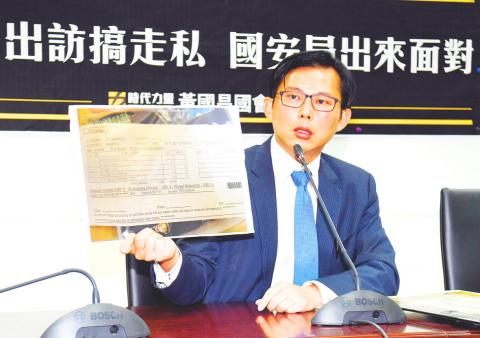A National Security Bureau (NSB) official accompanying President Tsai Ing-wen (蔡英文) on a state visit to the Caribbean was arrested after allegedly trying to smuggle 9,200 cartons of cigarettes worth more than US$200,000 into Taiwan, New Power Party Legislator Huang Kuo-chang (黃國昌) said yesterday.
Wu Tsung-hsien (吳宗憲) allegedly ordered the cigarettes through China Airlines Ltd’s (CAL, 中華航空) online duty-free store with the help of airline officials on July 8, three days before embarking on the trip, Huang said.
The cigarettes include 4,400 cartons of Mevius Original Blue, 1,900 cartons of Movies Sky Blue and 1,200 cartons of Mi-Ne Original, priced from US$16 to US$30 per carton, he said.

Photo: CNA
In Taiwan, Mevius cigarettes sell for about NT$1,200 per carton, he added.
The cigarettes, purchased through five orders totaling US$208,350, were paid by Wu using one credit card, Huang said.
Under customs laws, only certified sellers can import more than five cartons of cigarettes and any amount of cigarettes that exceed one carton must be taxed, he added.
The cigarettes were allegedly hidden in CAL’s storage facility for duty-free goods and after Tsai’s airplane landed at Taiwan Taoyuan International Airport yesterday afternoon, they were placed with cargo unloaded from the airplane to avoid customs inspections, he said.
Huang quoted bureau Deputy Director-General Hu Mu-yuan (胡木源) as saying that Wu was arrested before he passed through customs at the airport.
Wu is an official at the Presidential Office’s Department of Security Affairs and denied that the cigarettes were for bureau members, Huang said, quoting Hu.
“A logical guess would be that the cigarettes were for sale. I do not believe they were all for personal use,” Huang said.
Officials who would sell out for just a few million New Taiwan dollars are not qualified to work at the bureau, Huang said, adding that the bureau and the airline owe the public an explanation.
The Presidential Office last night issued a statement saying that Tsai was enraged by the incident and demanded that the case be thoroughly investigated, adding that she has accepted National Security Bureau Director-General Peng Sheng-chu’s (彭勝竹) resignation.
The bureau said it has launched a probe, declining to provide details, citing an ongoing investigation.
CAL in a statement denied that the airline management helped Wu purchase the cigarettes.
“We cannot stop passengers from buying cigarettes exceeding the limit set by customs, although we would normally give them a reminder. It is the passenger’s responsibility to make a customs declaration,” CAL spokesman Jason Liu (劉朝洋) said.
CAL stored the cigarettes in its bonded warehouse, as Wu had paid for them, but the airline did not know whether he had declared them to customs, Liu said.
The Customs Administration yesterday said that 196 boxes, or 9,800 cartons, of cigarettes were stored in a warehouse belonging to China Pacific Catering Services Ltd (華膳空廚) and were not loaded on a chartered airplane used in Tsai’s state visit.
A task force it formed with the Investigation Bureau took the cigarettes to the Taipei Customs warehouse and did not allow them to go through customs clearance through the use of special procedures for national guests, the agency said in a statement.
Additional reporting by Kao Shih-ching, staff writer and CNA

AGING: As of last month, people aged 65 or older accounted for 20.06 percent of the total population and the number of couples who got married fell by 18,685 from 2024 Taiwan has surpassed South Korea as the country least willing to have children, with an annual crude birthrate of 4.62 per 1,000 people, Ministry of the Interior data showed yesterday. The nation was previously ranked the second-lowest country in terms of total fertility rate, or the average number of children a woman has in her lifetime. However, South Korea’s fertility rate began to recover from 2023, with total fertility rate rising from 0.72 and estimated to reach 0.82 to 0.85 by last year, and the crude birthrate projected at 6.7 per 1,000 people. Japan’s crude birthrate was projected to fall below six,

Conflict with Taiwan could leave China with “massive economic disruption, catastrophic military losses, significant social unrest, and devastating sanctions,” a US think tank said in a report released on Monday. The German Marshall Fund released a report titled If China Attacks Taiwan: The Consequences for China of “Minor Conflict” and “Major War” Scenarios. The report details the “massive” economic, military, social and international costs to China in the event of a minor conflict or major war with Taiwan, estimating that the Chinese People’s Liberation Army (PLA) could sustain losses of more than half of its active-duty ground forces, including 100,000 troops. Understanding Chinese

SELF-DEFENSE: Tokyo has accelerated its spending goal and its defense minister said the nation needs to discuss whether it should develop nuclear-powered submarines China is ramping up objections to what it sees as Japan’s desire to acquire nuclear weapons, despite Tokyo’s longstanding renunciation of such arms, deepening another fissure in the two neighbors’ increasingly tense ties. In what appears to be a concerted effort, China’s foreign and defense ministries issued statements on Thursday condemning alleged remilitarism efforts by Tokyo. The remarks came as two of the country’s top think tanks jointly issued a 29-page report framing actions by “right-wing forces” in Japan as posing a “serious threat” to world peace. While that report did not define “right-wing forces,” the Chinese Ministry of Foreign Affairs was

US President Donald Trump in an interview with the New York Times published on Thursday said that “it’s up to” Chinese President Xi Jinping (習近平) what China does on Taiwan, but that he would be “very unhappy” with a change in the “status quo.” “He [Xi] considers it to be a part of China, and that’s up to him what he’s going to be doing, but I’ve expressed to him that I would be very unhappy if he did that, and I don’t think he’ll do that. I hope he doesn’t do that,” Trump said. Trump made the comments in the context